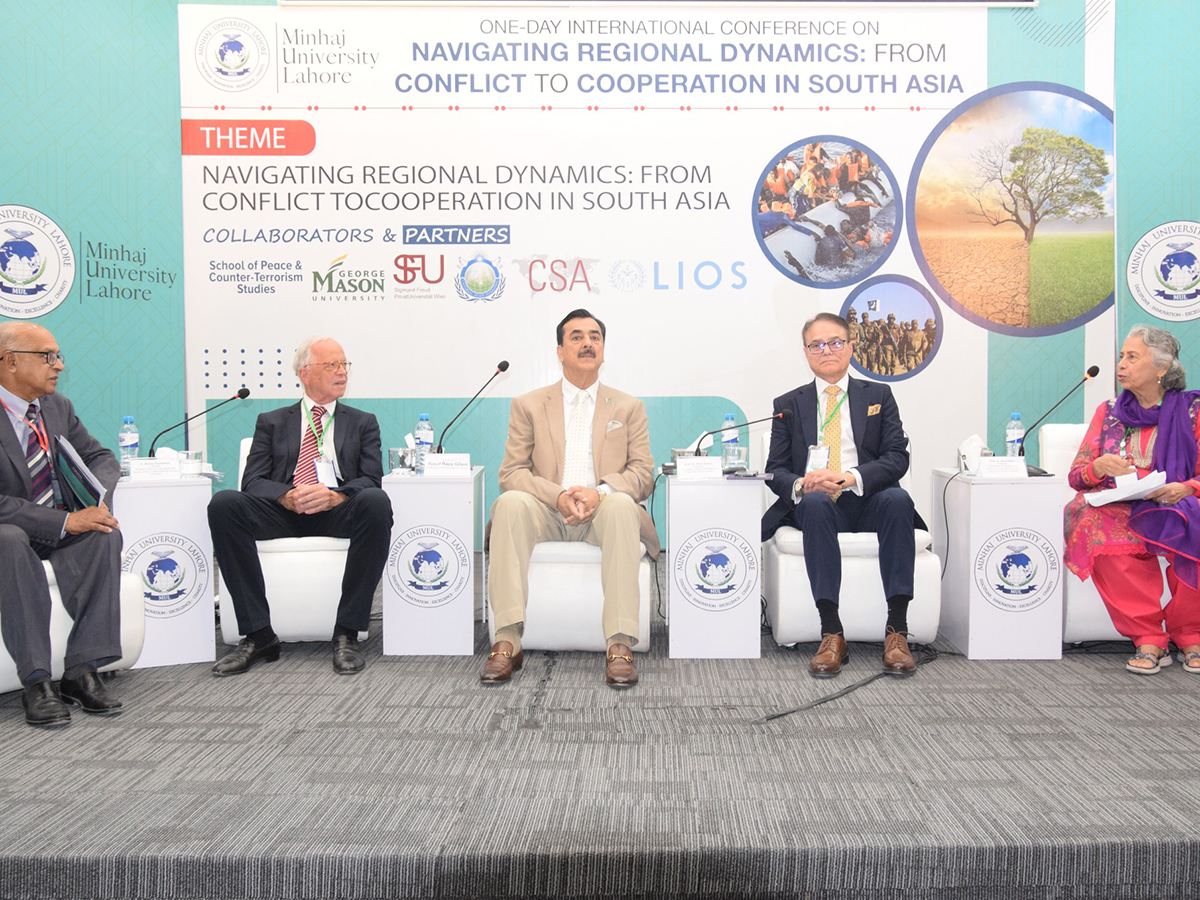First International Conference on Navigating Regional Dynamics: From Conflict to Cooperation in South Asia
- November 30, -0001
Professor Dr. Hussain Mohi-ud-Din Qadri, Deputy Chairman of the Board of Governors at Minhaj University Lahore, delivered the keynote address at the International Conference on "Navigating Regional Dynamics: Moving from Conflict to Cooperation in South Asia."
He warmly welcomed distinguished guests, including Prof. Dr. Sajid Mahmood Shahzad, as well as internationally reputed dignitaries such as Prof. Dr. Werner Fasslabend, Prof. Dr. Heinz Gartner, Prof. Dr. Afsar Rathor, Prof. Dr. Franz Baumann, Secretary-General of MQI Khurram Nawaz Gandapur, Vice President of MQI Brig (R) Iqbal Ahmad Khan, representatives from various national and international organizations, esteemed professors, faculty members, and a cherished audience comprising students from Minhaj University and other universities in Lahore.
The conference's theme encompassed environmental issues in the region, counterterrorism, and the challenge of irregular migration, all interconnected with security—security not only of territory but also of individuals. Dr. Hussain Qadri emphasized the evolving concept of national security, transitioning towards human security, which encompasses freedom from fear, freedom from want, and a life with dignity.
He highlighted the dual nature of threats to human security: localized threats specific to different societies and regions and globalized threats that transcend national boundaries, such as terrorism and communicable diseases like COVID-19. Dr. Hussain Qadri referenced the seven specific values outlined in the Human Development Report of 1994 that underpin the concept of human security, including economics, food, health, environment, personal safety, community protection, and political security.
Dr. Hussain Qadri stressed the importance of prioritizing human security over territorial or institutional security, especially in addressing terrorism, which has inflicted significant loss of life and economic damage in Pakistan. He commended efforts such as the Zarb-e-Azab military operation against terrorism and the parallel Zarb-e-Aman movement initiated by Shaykh-ul-Islam Prof. Dr. Muhammad Tahir-ul-Qadri to promote peace through education and tolerance.
Furthermore, Dr. Hussain Qadri discussed Pakistan's challenges regarding financial stability and irregular migration, emphasizing the need for collaboration between developed and developing countries to achieve sustainable development goals and prevent youth radicalization. He underscored the potential of Pakistan's youthful population as both an opportunity and a challenge, urging investment in skills and trade rather than reliance on aid and loans.
In conclusion, Dr. Hussain Qadri called for collective efforts to harness the potential of Pakistan's youth for the country's and the world's benefit, emphasizing the importance of trust, investment, and empowerment in shaping a prosperous future.
Dr. Hussain Qadri congratulated the School of Political Science and the School of Peace and Counter-Terrorism Studies at Minhaj University Lahore for organizing such a remarkable conference on a highly significant and pressing topic. He extended his appreciation to Dr. Yasir Khan, Ms. Mechthild Geyer, Dr. Adeel Irfan, and the Dean of Social Sciences for their outstanding efforts in making the conference possible.
He warmly welcomed distinguished guests, including Prof. Dr. Sajid Mahmood Shahzad, as well as internationally reputed dignitaries such as Prof. Dr. Werner Fasslabend, Prof. Dr. Heinz Gartner, Prof. Dr. Afsar Rathor, Prof. Dr. Franz Baumann, Secretary-General of MQI Khurram Nawaz Gandapur, Vice President of MQI Brig (R) Iqbal Ahmad Khan, representatives from various national and international organizations, esteemed professors, faculty members, and a cherished audience comprising students from Minhaj University and other universities in Lahore.
The conference's theme encompassed environmental issues in the region, counterterrorism, and the challenge of irregular migration, all interconnected with security—security not only of territory but also of individuals. Dr. Hussain Qadri emphasized the evolving concept of national security, transitioning towards human security, which encompasses freedom from fear, freedom from want, and a life with dignity.
He highlighted the dual nature of threats to human security: localized threats specific to different societies and regions and globalized threats that transcend national boundaries, such as terrorism and communicable diseases like COVID-19. Dr. Hussain Qadri referenced the seven specific values outlined in the Human Development Report of 1994 that underpin the concept of human security, including economics, food, health, environment, personal safety, community protection, and political security.
Dr. Hussain Qadri stressed the importance of prioritizing human security over territorial or institutional security, especially in addressing terrorism, which has inflicted significant loss of life and economic damage in Pakistan. He commended efforts such as the Zarb-e-Azab military operation against terrorism and the parallel Zarb-e-Aman movement initiated by Shaykh-ul-Islam Prof. Dr. Muhammad Tahir-ul-Qadri to promote peace through education and tolerance.
Furthermore, Dr. Hussain Qadri discussed Pakistan's challenges regarding financial stability and irregular migration, emphasizing the need for collaboration between developed and developing countries to achieve sustainable development goals and prevent youth radicalization. He underscored the potential of Pakistan's youthful population as both an opportunity and a challenge, urging investment in skills and trade rather than reliance on aid and loans.
In conclusion, Dr. Hussain Qadri called for collective efforts to harness the potential of Pakistan's youth for the country's and the world's benefit, emphasizing the importance of trust, investment, and empowerment in shaping a prosperous future.
Dr. Hussain Qadri congratulated the School of Political Science and the School of Peace and Counter-Terrorism Studies at Minhaj University Lahore for organizing such a remarkable conference on a highly significant and pressing topic. He extended his appreciation to Dr. Yasir Khan, Ms. Mechthild Geyer, Dr. Adeel Irfan, and the Dean of Social Sciences for their outstanding efforts in making the conference possible.
